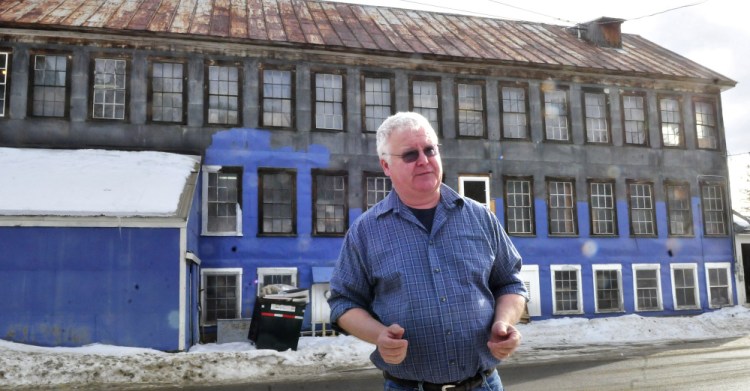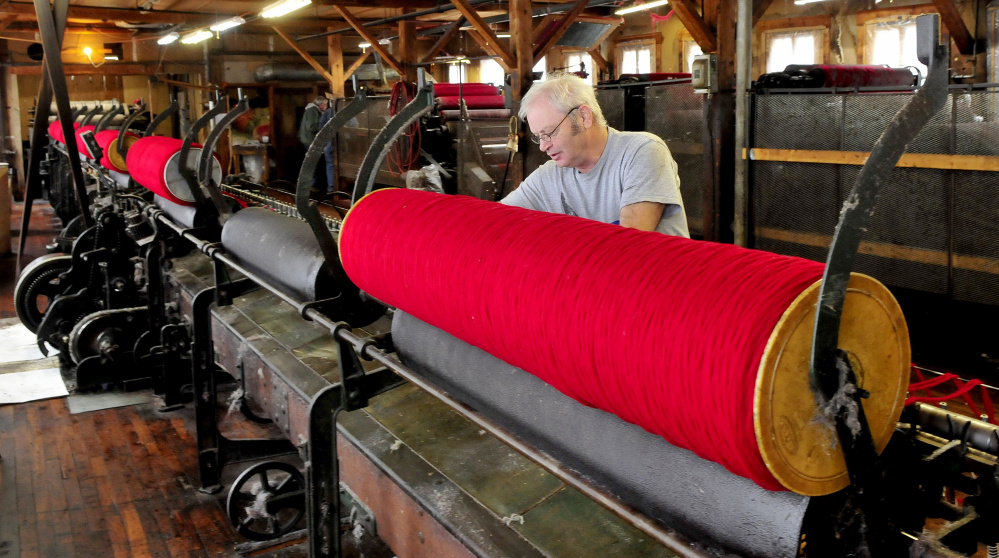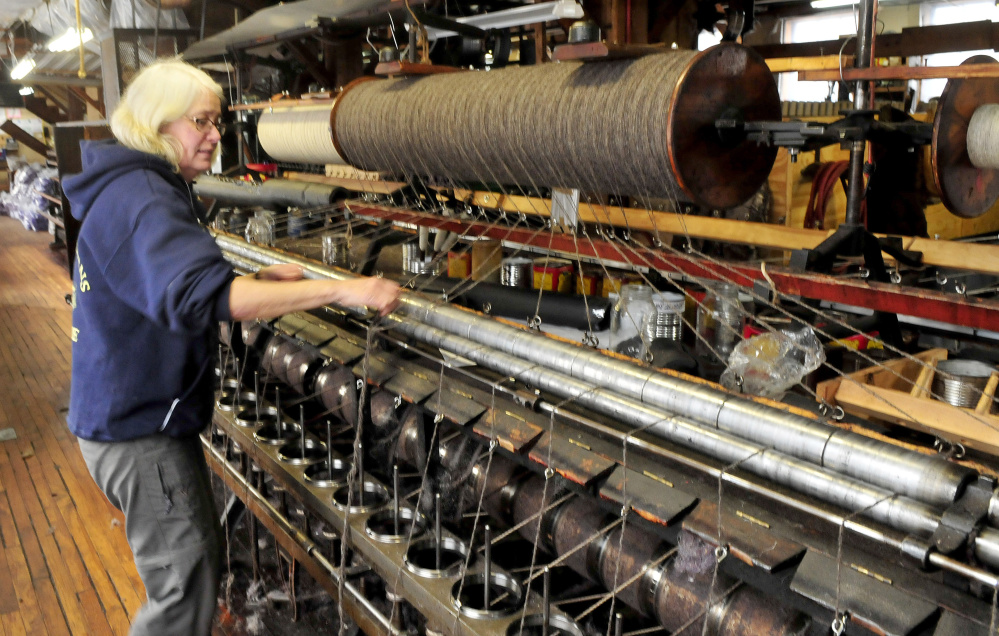HARMONY — A 150-foot-long spinning mule races back and forth on steel wheels and thin rails like a small railroad train at Bartlettyarns woolen mill in Harmony.
Built in 1948, the mule is spinning 240 bobbins of wool into yarn and it’s the last of its kind in the United States, said Lindsey Rice, who with his wife, Susan, owns and operates the three-story woolen mill on the banks of Higgins Stream.
The textile mill has been in operation on the same spot since 1821, powered first by a water wheel that was replaced by a water turbine and then finally converted to electricity.
“In 1920, the original building burned and was replaced with the building that you see today in 1921,” Rice said. “For its day, it was very modern – a lot of windows, metal clad siding, metal roof making it fire-resistant.”
One of the machines inside the mill – a round rover – dates back to the 1880s, and most of the iron and wood equipment has been in use since the early 1900s. The Rice family bought the place in 2007 from Russell Pierce, who had owned it for 24 years.
GRANT WILL HELP WITH UPGRADING
Known for its wool yarn, wool roving, knitwear, weaving, rug yarns, supplies and gifts, Bartlettyarns this month was named one of eight finalists for Maine Department of Agriculture, Conservation and Forestry grants totaling $250,000.
The Rices plan to use the grant money to upgrade their operation with a commercial wool baler.
“Bartlettyarns is pleased to have been selected by the state to receive this grant,” Rice said. “We currently pack our wool manually, which is the traditional method, but the new equipment we are hoping to acquire will greatly increase the density of our packed wool.”
The company ships the raw wool from farmers to be washed. A typical tractor-trailer holds about 20,000 pounds of wool, Rice said. With the new equipment they will be able to increase that weight to more than 45,000 pounds per load. The bales will be more uniform in size and shape, which will make handling easier, he said. The baler will come from Australia, because balers of that type are not made in the U.S.
Seven people are employed inside the old factory and one more at the reception desk in the main office and retail shop across the street.
Rice said raw wool is bought from sheep farmers all over the Northeast, including North Star Sheep Farm, which has 3,500 sheep in Windham.
The wool is delivered to the mill receiving shed in Harmony and shipped off to South Carolina to be commercially washed, then dyed in Philadelphia and returned to Maine to be made into yarn.
“They do the shearing and sell us the raw wool, and we’re taking that raw wool and making it into the yarn and it becomes a Christmas stocking or a wool sweater or goes to a shop,” Rice said.
THE BASEMENT
The process of making the yarn begins in the basement of the mill, which was used as a set for the Steven King movie “Graveyard Shift” in 1990.
Old machinery, one piece called a duster installed in 1935, which tumbles the wool to loosen it up, and another called a picker, which teases and opens up the fiber, sit in the basement and are the first stops on the way to making yarn. The loosened wool is then blown into a holding room.
A recent visit found wool already dyed bright red cranberry for Christmas stockings that Rice said a company in Wisconsin knits.
The upper two floors hold perfectly working antique machinery, including a “carding” machine made in Boston in 1919 and a 1928 twister.
But the main attraction at Bartlettyarns is the spinning mule running back and forth on the railroad tracks, which twists the thin yarn fiber into stronger thicker yarn.
There still are four textile mills in Maine, including one in Etna, which has state-of-the-art machinery, Rice said.
“We specialize in making knitting yarn,” Rice said. “We don’t deal with any big-box stores. Everything that we do goes to local yarn shops where they’re working with that local hand knitter. We’re still working directly with the consumer and the farmer.”
One of the local shops that uses Bartlettyarns products is Happy Knits, a shop inside the Somerset Grist Mill complex at the former county jail in downtown Skowhegan.
Rice said it can take six months to a year to learn all the jobs at Bartlettyarns.
Rice said the company’s inventory includes 65 different colors of finished yarn in five different weights and thicknesses.
He said some of the yarn is knitted into sweaters at a mill in Fall River, Massachusetts. The sweaters and knitted hats are sold in the Bartlettyarns shop and other locations in Maine as well as a store in Japan. Other items at the Harmony shop are knitted locally as piecework, with materials provided by the company, Rice said.
The Harmony woolen mill is one of a dying breed of Made In America textile outlets, Rice said.
“The spinning mule on the third floor, that’s the last commercial operating one in the United States,” he said. “There are other mills nationwide. Maybe two dozen of us left.
“We’re not a museum – we’re a production mill.”
Send questions/comments to the editors.






Success. Please wait for the page to reload. If the page does not reload within 5 seconds, please refresh the page.
Enter your email and password to access comments.
Hi, to comment on stories you must . This profile is in addition to your subscription and website login.
Already have a commenting profile? .
Invalid username/password.
Please check your email to confirm and complete your registration.
Only subscribers are eligible to post comments. Please subscribe or login first for digital access. Here’s why.
Use the form below to reset your password. When you've submitted your account email, we will send an email with a reset code.